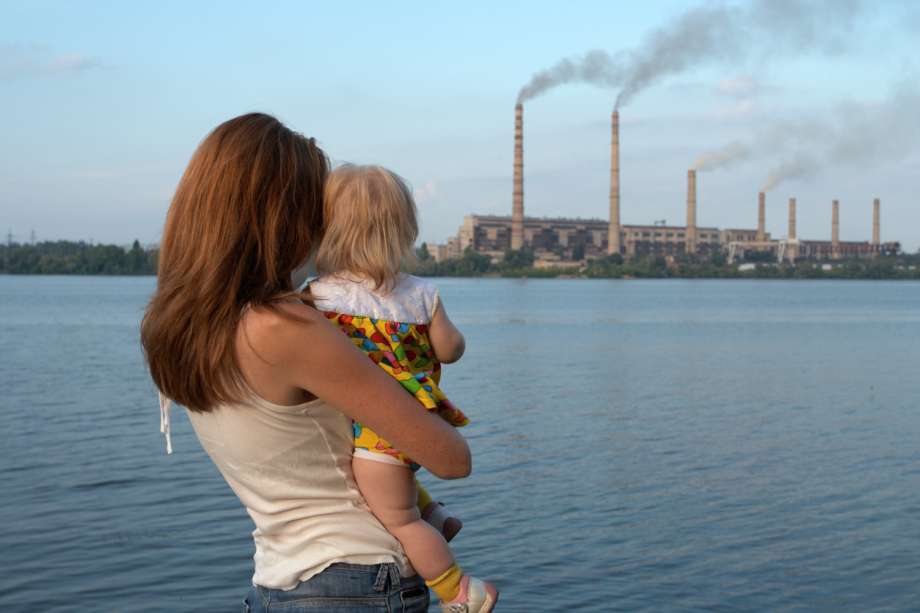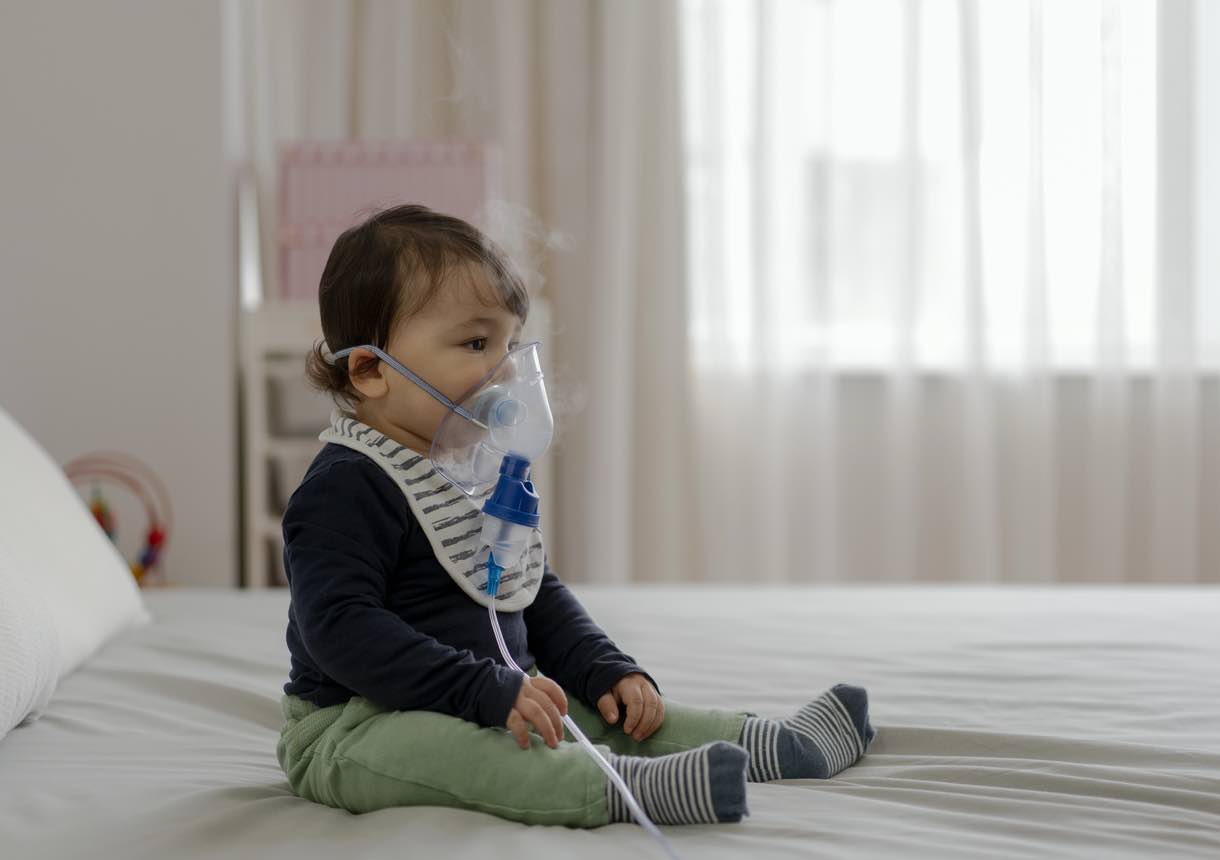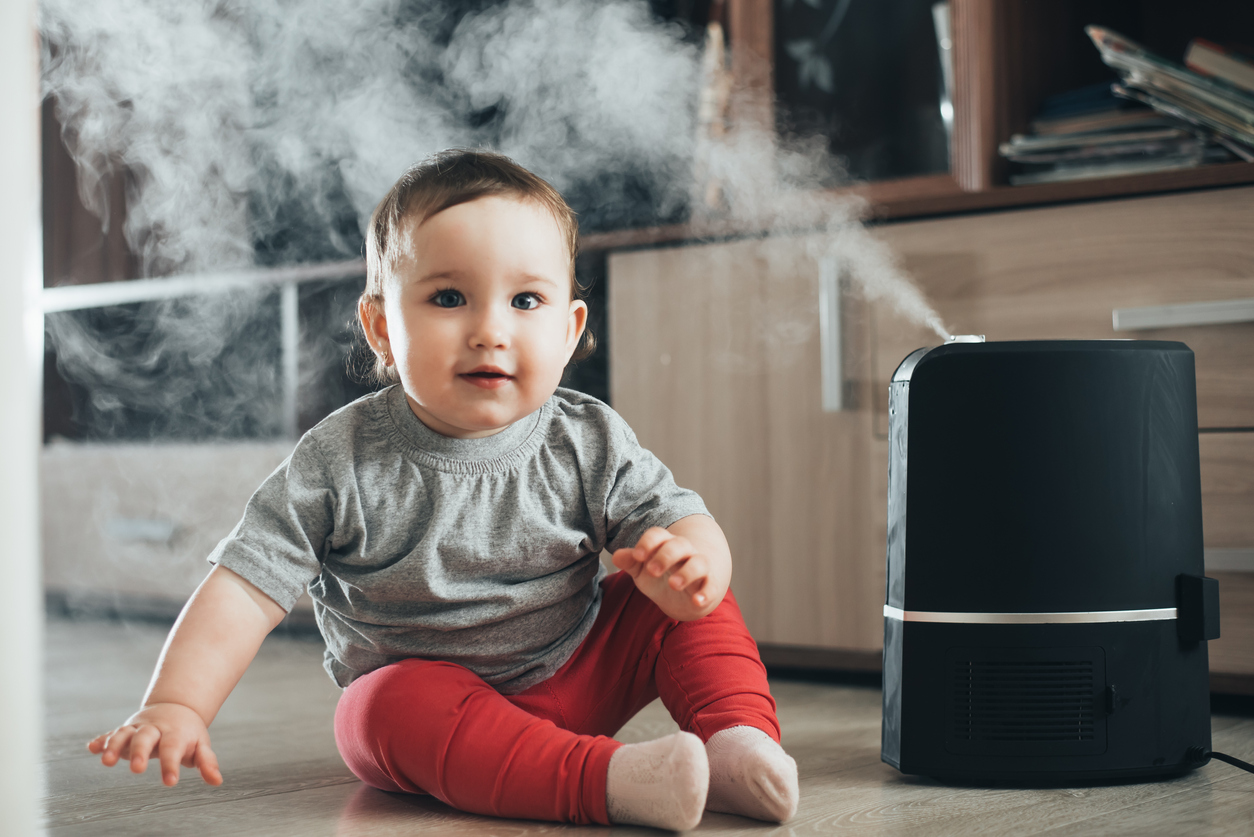How Does Bad Air Quality Affect Babies? Air Pollution in Early Childhood

Most of us have experienced mild effects of poor air quality such as burning eyes or throat. But even moderate air pollution can have serious health consequences for babies, small children, and pregnant women.
So, what are the effects of air pollution on babies and pregnant people? And how can air pollution exposure affect children’s health from before birth, to early childhood, and beyond?
Related: Consequences of Air Pollution and Pregnancy
How Do You Measure Air Quality?
When trying to determine the level of air pollution in your area, your local air quality index is your first stop.
What is an Air Quality Index?
An Air Quality Index (AQI) is a measure of the quality of outdoor air in a given place. The data from air quality sensors in an area is used to create a numerical score that can represent the levels of air pollution and concentration of different pollutants in a given area. It can also be used to create an air quality forecast for a specific region.
An air quality index measures different types of pollution, including:
- Particulate matter
- Ozone
- Nitrogen Dioxide
- Carbon Monoxide
- Sulfur Dioxide
- Chemical pollution such as dioxins, mercury, lead, benzene, methane, etc.
- Allergens
And others.
Different areas have different pollutants, so the index for any given area will measure the level of pollution due to local pollutants.
You may see your local AQI displayed in terms of numerical ranges, color codes, and other descriptors. Local authorities may use this information to issue environmental health advisories.
The Air Quality Index and Babies/Children
As the AQI score rises, so do the public health implications, especially for vulnerable populations such as children, the elderly, and people with respiratory or cardiovascular issues. Babies and children are particularly at risk for a number of reasons.
Why?
First, the lungs of babies and children are still developing. Air pollution can disrupt this development, increasing their chances of poor health outcomes in the future.
Babies and children inhale more air per unit of body weight than adults, and their bodies are less able to metabolize, detoxify, and excrete toxins than the bodies of adults. As a result, the effects of air pollution are more serious for them.
Neurotoxic compounds in the air can affect developing brains.
And babies born to women exposed to air pollution have a higher risk of prematurity and low birth weight (World Health Organization).
And that’s just the beginning.
When the air quality index number is high, so is the level of outdoor air pollution. So when local authorities advise wearing masks, avoiding outdoor activities, and other protective measures, it’s a good idea to take that advice seriously.
What Causes Poor Air Quality?

Many different things can affect the quality of the air.
Emissions from fossil fuels are a major culprit. In 2018, air pollution from fossil fuel emissions caused more than eight million deaths worldwide (Burrows, 2021). Of those, 18 percent were attributed to particulate matter alone.
Gas and coal combustion also releases chemical pollutants that can be very dangerous, even in small amounts. These include benzene, dioxins, lead, and mercury.
Wildfires, like those that have ripped through southern California and Canada, are another source of particulate matter. And as climate change progresses, the frequency and severity of these fires will increase.
Allergens, such as mold and pollen, can also affect air quality. Climate change is affecting these pollutants as well, by increasing flooding and wet conditions, which increases mold growth, and lengthening the pollen season (NDRC, 2021).
Is it Only Outdoor Air Pollution That’s the Problem?
No. Indoor air pollution can also cause problems for babies and children. In fact, according to the World Health Organization, in 2016, indoor air pollution caused 543,000 deaths of children under the age of five, and 52,000 deaths of children between the ages of five and 15 (World Economic Forum, 2021).
What can affect indoor air quality? Several things (EPA, 2023).
Tobacco smoke is an obvious indoor pollutant. The health implications of secondhand smoke—increased cancer risk, lung irritation, and so forth—are well known. This includes marijuana smoke and vapor from e-cigarettes.
Biological pollutants such as mold, pollens, bacteria, and viruses can provoke allergic reactions and other health problems. Urine from rodents, insect droppings, and dust can likewise cause problems for some people.
Chemicals such as carbon monoxide, nitrogen dioxide, and radon can cause irritation, pulmonary edema, increased risk of respiratory infections, and more.
Household chemicals such as pesticides, and the volatile organic compounds from cleansers, disinfectants, and other household products, can also affect indoor air quality.
On top of that, air conditioning systems circulate pollutants as well as air, spreading the polluted air throughout the indoors.
Does Air Quality Affect Pregnant Women?
Yes. Air pollution exposure poses numerous health risks for pregnant women.
One study found that exposure to air pollution puts a pregnant woman at a higher risk for developing gestational diabetes (Sun et ali, 2022).
Another study found a higher risk of miscarriage in women who had been exposed to ozone and particulate pollution (Ha, 2017).
In addition, several studies have found that ambient air pollution puts pregnant people at a higher risk for preeclampsia (Hu, 2020; Bearblock et al, 2021).
Air pollution is also a widely recognized risk for preterm birth and low birth weight.
How Does Air Pollution Affect Babies and Children?
Air pollution, both inside and outdoors, can cause a variety of negative health effects for babies and young children.
First, exposure to air pollution causes an increased risk of sudden infant death syndrome (SIDS).
Also, air pollution can put babies and children at risk for developing high blood pressure (American Heart Association, 2019). This, in turn, can increase their risk of heart disease, chronic diseases, and other problems later in life.
Babies whose mothers were exposed to air pollution are at a greater risk for developing heart defects and other health problems. (Williamson, 2023).
Air pollution can also increase a child’s risk of respiratory diseases and affect lung function.
It can also negatively affect children’s immune systems (Prunicki et al., 2021).
Exposure to pollution can also lead to behavioral disorders and impaired mental and motor development.
And this is only scratching the surface.
How can I Protect my Baby from Bad Air Quality?
There are ways to protect yourself, your children, and your unborn babies from air pollution. The World Health Organization has some top tips for you.

Avoiding Indoor Air Pollution
One easy way to keep indoor air clean is to not smoke or vape indoors. Even better, if you or someone in your household smokes tobacco, marijuana, or vapes, quitting will benefit them, too.
Clean up your cooking technologies. Choose an ultra-low emission stove, or use cleaner fuels to cook, such as electricity or solar. Always cook in a well-ventilated area, or even outside. Avoid using kerosene for either cooking or lighting.
Choose cleaner technologies, like electricity, to heat and light your home.
Be careful about the types of household chemicals you use. Consider natural cleaning products, such as vinegar, instead of commercial cleansers.
Related: Going Green: Top 10 Household Products to Avoid
Avoiding Outdoor Air Pollution
Don’t burn your garbage. Compost and recycle when possible.
Try to reduce your family’s exposure to vehicle exhaust. If possible, avoid busy roads, and choose routes with less traffic. Carry babies and small children in high-traffic areas so that they aren’t at the same height as car exhaust emissions.
Keep an eye on your local air quality index, and follow any recommendations for protective measures.
Your Baby’s Health is In Your Hands
Air quality can affect your life and the lives of your children, even before they’re born. Take measures to protect your family, and if you have any questions or concerns, contact your healthcare provider.

